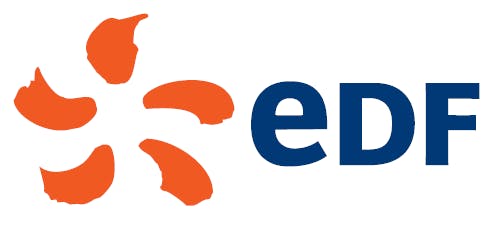3. Non-financial performance
3.3 Well-being and solidarity3.2.4.4.3 Decommissioning and radioactive waste
Waste resulting from the decommissioning of power plants and associated industrial activities is identified in France using the indicators of very-low level solid radioactive decommissioning and industrial waste and low-level and intermediate-level radioactive waste. For the Group in France, the volume of VLL waste was 2,007m3 in2020, compared to 2,481m3 in 2019 and 4,111m3 in 2018. The volume of low-level and intermediate-level waste is 251m3 in 2020, compared to 785m3 in 2019 and 321m3 in 2018.
Waste from Framatome’s industrial activities in Belgium and the USA is identified by class A radioactive waste indicators. In the USA, the volume of Class A waste is 378m3 in 2020, compared to 235m3 in 2019 and 208m3 in 2018. In Belgium, decommissioning activities at the Dessel site are being completed and did not produce Class A waste in 2020, whereas they represented 87m3 in 2019 and 168m3 in 2018. For methodological clarifications related to this data, see section 3.7.2.2“Details on performance indicators”.
Regarding metal materials with activity well below safety thresholds, EDF is in favour of the alignment of French regulations with the European regulatory framework(“release” thresholds) to authorise, after processing and checking at a dedicated facility, conventional recycling of a significant proportion of metal materials from decommissioning operations. Currently, in France, all waste from a “potential nuclear waste generation zone”, irrespective of its level of activity, is considered as radioactive waste and cannot be recycled outside the nuclear industry.
3.2.4.4.4 Nuclear power and “DNSH” criteria within the framework of the European taxonomy
The work carried out in 2019 by the European Commission to establish the classification of sustainable economic activities has identified nuclear energy as a contributor to the fight against climate change: nuclear energy meets the first environmental objective of the taxonomy.
Additional expertise was requested to verify the absence of harm with respect to the other objectives (Do No Significant Harm to the Environment, DNSH). A specific study was assigned to the Commission’s official research institute, the Joint ResearchCentre (JRC), to evaluate nuclear energy with regard to these criteria, the results of which are expected in early 2021.
At the same time, recent studies show that nuclear technology has its place in the European taxonomy:
- ARUP(1), a British engineering firm found that “the sector is more than compliant and in a strong position to benefit from sustainable funding”;
- CEPN, a French consulting firm specialising in radiation protection which carried out a study based entirely on public documents(2). This study validates the robustness of safety standards that call for a high level of environmental protection: radioactive waste management meets the environmental objectives of the DNSH. Nuclear energy meets all the objectives set by the European taxonomy. Present and future radioactive waste storage and disposal facilities guarantee sustainable nuclear power.
3.3 Well-being and solidarity
The Group’s raison d’être is heavily based on personal well-being and solidarity development, for both its employees and all its stakeholders. The four main CSR commitments identified in this respect are the health and safety of all individuals, ethics and human rights, the promotion of equality, diversity and inclusion and the prevention of energy poverty and promotion of social innovation.
WELL-BEING AND SOLIDARITY
| CSR COMMITMENTS | CONTRIBUTION TO THE UN SD GOALS | KEY PERFORMANCE INDICATORS |
|---|---|---|
PROTECTING THE HEALTH AND SAFETY OF ALL |   | PROTECTING THE HEALTH AND SAFETY OF ALL KEY PERFORMANCE INDICATORSNuclear safety: Number of significant level 2 events on the INES scale |
| CSR COMMITMENTS Global LTIR (Employees and service providers) | ||
| CSR COMMITMENTS Number of fatal accidents connected to business-specific risks (employees and providers) | ||
ETHICS, COMPLIANCE AND HUMAN RIGHTS |  | ETHICS, COMPLIANCE AND HUMAN RIGHTS KEY PERFORMANCE INDICATORSProportion of executives who have completed the anti-corruption training programme |
EQUALITY, DIVERSITY AND INCLUSION |   | EQUALITY, DIVERSITY AND INCLUSION KEY PERFORMANCE INDICATORSGender balance index: percentage of women in the Management Committees of the Group's entities |
| CSR COMMITMENTS Percentage of employees who have taken part in a skills development initiative | ||
| CSR COMMITMENTS Rate of employees covered by a collective bargaining agreement | ||
ENERGY POVERTY AND SOCIAL INNOVATION |   | ENERGY POVERTY AND SOCIAL INNOVATION KEY PERFORMANCE INDICATORSNumber of energy support |
* For the indicator concerning social dialogue and related explanation, see section 3.5.2.4 "Social dialogue".
3.3.1 Health and safety for all
EDF is committed to protecting the health and safety of all individuals. As part of this, the Group is committed to developing the highest standards in terms of nuclear and hydropower safety, health policies for its employees and subcontractors (reducing the number of accidents, eradicating fatal accidents, developing the management of psychosocial risks, adapting work organisation methods to ensure well-being, guaranteeing a high level of social welfare, etc.), sales offerings related to comfort and well-being, improvement of air quality and reductions in noise, visual or light pollution.
